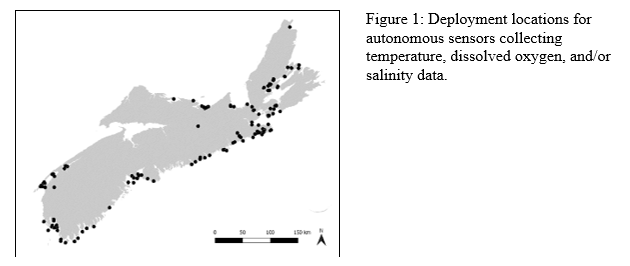SUPPORTING AQUACULTURE THROUGH COASTAL OCEAN MONITORING AT BIOLOGICALLY RELEVANT SCALES
Coastal ocean monitoring is critical for informing aquaculture management decisions such as, site selection, engineering specifications, and carrying capacity. Dedicated nearshore monitoring is required to measure timeseries of complex coastal dynamics at multiple depths, which cannot be captured by broad-scale or offshore monitoring. Long-term data sets are also becoming increasingly valuable to prepare for and understand climate change influenced events such as low oxygen occurrences at net pens.
The Centre for Marine Applied Research (CMAR) in Nova Scotia, Canada coordinates an extensive Coastal Monitoring Program to address this fundamental data need. CMAR maintains a network of nearly 70 oceanographic moorings that measure Essential Ocean Variables (e.g., temperature, dissolved oxygen, salinity, sea state, currents), typically within 1 km of Nova Scotia’s coast.
To our knowledge, the resulting oceanographic data products are unique in Canadian coastal waters for their static depth profiles, time series length, and high spatial and temporal resolution. CMAR ensures these data are freely available on several platforms and in multiple formats (e.g., summary reports, processed data) to ensure maximum access. Aquaculture and coastal stakeholders are now using this coastal data for diverse applications. Implications and future plans for CMAR’s Coastal Monitoring Program are discussed.
